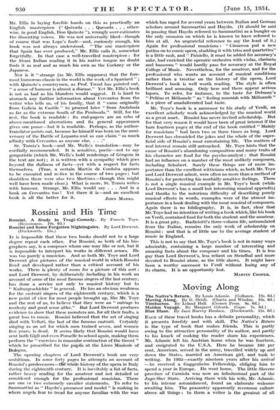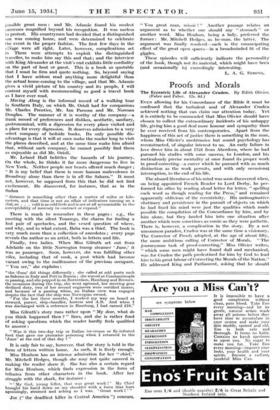Moving Along
EACH of these travel books has a defmite personality, which it presents forcibly and with skill. The Native's Return is the type of book that makes friends. This is partly owing to the attractive personality of its author, and partly to his knack of making the reader share his experiences. Mr. Adamic left his. Austrian home when he was fourteen, and emigrated to the U.S.A. Here he. became 100 per cent. American, served in the army, travelled widely up and down the States, married an American girl, and took to writing. In 1982—exactly nineteen years after his arrival —he received a Guggenheim Fellowship, obliging him to spend a year in Europe. He went home. The little Slovene province of Carniola was now an infinitesimal part .of the Jugo-Slav State. Arriving there with his wife, Mr. Adamic, to his intense astonishment, found an elaborate welcome awaiting him. The peasantry• apparently reverence culture above. all things : to them a writer is the greatest of all possible great men : and Mr. Adamic found his modest successes magnified beyond his recognition. It was useless
to protest. His countrymen had decided that a distinguished son was coming home, and were determined to celebrate the event in the proper fashion. The first few days in the vEiage were all right. Later, however, complications set in There were attempts to exploit the distinguished traveller, to make him say this and that ; and the interview
with King Alexander at the visit's end exhibits little cordiality on the part of host or guest. This is a book so quotable that I must be firm and quote nothing. So, beyond saying that I have seldom' read anything more delightful than the actual home-coming to the village, and that Mr. Adamic gives a vivid picture of his country and its people, I will
content .myself with recommending as good a travel book as I have ever read.
Moving Along is the informal record of a walking tour in Southern Italy, on which Mr. Orioli had for companions Mr. Charles Prentice, Mr. Ian Parsons and Mr. Norman Douglas. The manner of it is worthy of the company—a frank record of preferences and dislikes, aesthetic, sanitary, gastronomical, with a digression for every place visited and a place for every digression. It deserves admission to a very select company of bedside books. Its only possible dis- advantage is that it will at once make the reader long to visit the places described, and at the same time make him afraid
that, without such company, he cannot possibly find them as enjoyable as did Mr. Orioli.
Mr. Leland Hall belittles the hazards of his journey. On the whole, he thinks it far more dangerous to live in New York. Neither people nor beasts offered much danger ; " It is my belief that there is more human malevolence in Broadway alone than there is in all the Sahara." It must not, however, be supposed from this that he did not find excitement. He discovered, for instance, that as in the Sudan •
" distance is something other than a matter of miles or kilo- meters, and that time is not an affair of indicators turning on a dial, so . . . cold is as cold feels and is not at all accountable to the susceptibility of mercury to contract or expand."
There is much to remember in these pages : e.g., the meeting with the silent Touaregs, the charm for finding a lost pair of spectacles, and the vexed question of where, and why, and to what extent, Baba was a thief. The book is very, much more than a collection of anecdotes ; every page reveals the author as an artist, both in letters and life.
Finally, two ladies. When Miss Gilruth set out from Adelaide on the little Norwegian tramp steamer June,' it was as passenger. Soon, however, she was fulfilling other
roles, including that of cook, a post which had become vacant owing to the malfeasance of the previous occtipant.
" You see," she ex-plains : "the 'June' did things differently ; she called at odd ports such as Salerno in Italy and Poti in Russia ; she waved at Constantinople in passing, and she popped in on Rotterdam, Hamburg and Bremen. On occasions during the trip, she went aground, her steering gear declined duty, two of her second engineers were certified insane, and because of a passing whim, an Italian crew was engaged despite the fact that the ship was Norwegian owned.
For the last three months, I worked my way on board as steward, purser, ship-chandler, hostess and A.B. And when I was discharged with a reference in Hamburg, I had earned £16."
Miss Gilruth's story runs rather upon " My dear, what do
you think happened then ? " lines, and she is rather fond of asking questions which the reader hardly feels qualified to answer :
" Was it this two-day trip or Italian ice-cream or fly-infested food that gave me ptomaine poisoning when I returned to the 'June' at the end of that day ?
It is only fair to say, however, that the story is told in the form of letters written home. As such, it is lively enough.
Miss Houlson has an intense admiration for her " chief," Mr. Mitchell Hedges, though she may not quite succeed in making the reader share it. She has also a certain regard for Miss Houlson, which finds expression in the form of tributes from other characters in the book. After her struggle with the shark, for instance :
" My God, young feller, that was great work ! ' My Chief brought his hand down on my shoulder with a force that hurt agonisingly, strained and aching as I was. Great work 1 '
'Joe (" the deadliest killer in Central America ") coneurs. " You great man, missie ! " Another passage relates an argument as to whether one should say " stomach " or another word. Miss Houlson, being a lady, preferred the former : Mr. Mitchell Hedges, as he-man, the latter. The argument was finally resolved—such is the emancipating effect of the great open spaces—in a broadminded fit of the giggles.
These episodes will sufficiently indicate the personality of the book, though not its material, which might have been (and occasionally is) exceedingly interesting.
L. A. G. STRONG.

















































 Previous page
Previous page